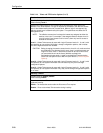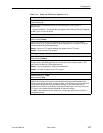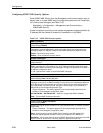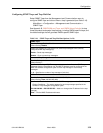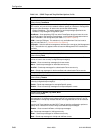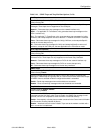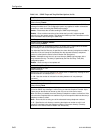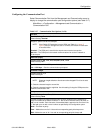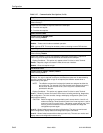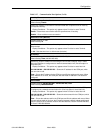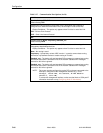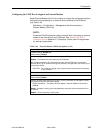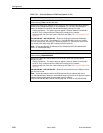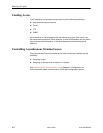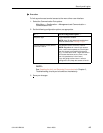
Configuration
3-64
9124-A2-LB20-00
March 2000
Table 3-17. Communication Port Options (2 of 4)
Stop Bits
Possible Settings: 1, 2
Default Setting: 1
Determines the number of stop bits used for the COM port.
1 – Provides one stop bit.
2 – Provides two stop bits.
Ignore Control Leads
Possible Settings: Disable, DTR
Default Setting: Disable
Specifies whether DTR is used.
Disable – Treats control leads as standard operation.
DTR – Ignores DTR. This may be necessary when connecting to some PAD devices.
Login Required
Possible Settings: Enable, Disable
Default Setting: Disable
Determines whether a user ID and password (referred to as the login) is required in
order to log on to the asynchronous terminal connected to the COM port.
Display Conditions – This option only appears when Port Use is set to Terminal.
Enable – Requires a login to access the menu-driven user interface.
Disable – Does not requires a login.
Port Access Level
Possible Settings: Level-1, Level-2, Level-3
Default Setting: Level-1
Specifies level of user access privilege for an asynchronous terminal connected to the
COM port. If a login is required for the port, the effective access level is determined by
the user’s access level. When a login is not required, the effective access level is
determined by this option.
NOTE: The effective access level is always the lowest one assigned to either the
port or the user. For example, if the Port Access Level assigned is Level-2,
but the User Access Level is Level-3, then only level-3 access will be
permitted for the port.
Display Conditions – This option only appears when Port Use is set to Terminal.
Level-1 – Allows full access and control of the device including monitoring, diagnostics,
and configuration. The user can add, change, and display configuration options, and
perform device testing.
CAUTION: Before changing the communication port’s access level to Level-2 or 3,
make sure that the Telnet Session Access Level is set top Level-1 and at
least one Login ID is set to Level-1. Otherwise, access will be lost. If this
occurs, you must reset the unit to the factory defaults and begin the
configuration process again.
Level-2 – Allows limited access and control of the device. The user can monitor and
perform diagnostics, display status and configuration option information.
Level-3 – Allows limited access with monitoring control only. The user can monitor and
display status and configuration screens only.



